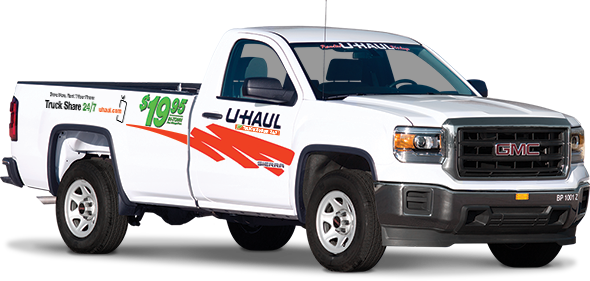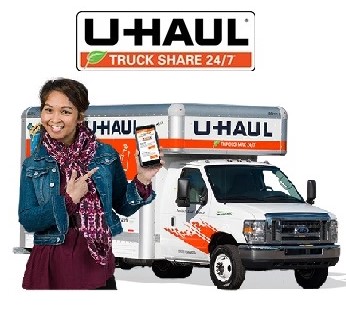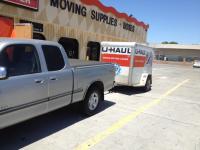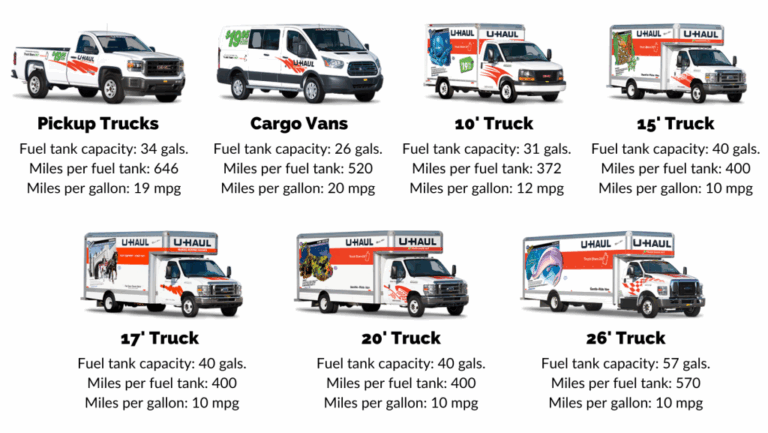U-Haul Pickup Truck Rentals: Your Comprehensive Guide to Hauling with Ease

U-Haul Pickup Truck Rentals: Your Comprehensive Guide to Hauling with Ease
In a world where DIY projects, local moves, and unexpected hauling needs are commonplace, the demand for accessible and affordable utility vehicles has never been higher. Enter U-Haul pickup truck rentals – a versatile and indispensable solution that empowers individuals and businesses alike to tackle a myriad of tasks with confidence. More than just a simple rental service, U-Haul’s pickup trucks represent a cornerstone of convenience, offering the perfect blend of power, practicality, and affordability for those moments when your personal vehicle just isn’t enough.
This comprehensive guide delves into every aspect of U-Haul pickup truck rentals, from understanding their benefits and fleet specifics to navigating the rental process, deciphering costs, and maximizing your experience. Whether you’re moving a couch, clearing out clutter, or embarking on a home improvement project, a U-Haul pickup truck rental might just be the perfect tool for the job.
I. Why Choose a U-Haul Pickup Truck? The Versatile Workhorse
When faced with the challenge of transporting bulky items, many automatically think of large moving trucks. However, for countless scenarios, a U-Haul pickup truck rental offers a more agile, cost-effective, and equally capable alternative. These compact powerhouses are the go-to choice for a surprising range of tasks, proving their worth as a true versatile workhorse.
Key Benefits and Use Cases:
- Small Moves: Ideal for studio apartments, dorm room moves, or transporting a few pieces of furniture. They eliminate the need for multiple trips in a smaller car.
- DIY Projects: From picking up lumber and landscaping supplies to hauling away construction debris, a pickup truck is a handyman’s best friend.
- Furniture and Appliance Transport: Safely move that new refrigerator, dining table, or mattress without damaging your personal vehicle.
- Junk Removal & Decluttering: Perfect for trips to the dump or recycling center, making decluttering efforts much more efficient.
- College Moves: Quick and easy for students moving in or out of dorms, transporting boxes, mini-fridges, and personal belongings.
- Local Errands: When you need to pick up a large purchase from a store, a U-Haul pickup truck saves on delivery fees and time.
- Cost-Effectiveness: Often cheaper to rent than larger box trucks or cargo vans, especially for local trips where mileage is a significant factor.
- Ease of Driving: Closer in feel to driving a large SUV than a commercial truck, making them less intimidating for many drivers.
Compared to larger U-Haul trucks, the pickup offers superior maneuverability, better fuel economy (for many users), and easier parking, making it an excellent choice when a full-sized moving truck is overkill.
II. Understanding the U-Haul Pickup Truck Fleet: What’s Available?
U-Haul’s pickup truck fleet primarily consists of light-duty trucks, with the Ford F-150 being a common model. These trucks are specifically configured for utility and ease of use, making them accessible to a wide range of renters.
Key Features and Specifications:
- Truck Model: Primarily Ford F-150 or similar light-duty pickups.
- Bed Size: Typically an 8-foot long bed. This generous length accommodates standard lumber, sheets of plywood, and most furniture items with ease.
- Seating Capacity: Designed to comfortably seat two adults.
- Transmission: Almost exclusively automatic, ensuring a smooth and straightforward driving experience for virtually any licensed driver.
- Comfort Features: Equipped with air conditioning, power steering, and power brakes for a comfortable and safe journey.
- Payload Capacity: While specific numbers vary by model year, U-Haul pickups are designed to handle significant weight in their beds, typically around 1,500-2,000 lbs. Always check the specific truck’s rating for precise figures.
- Towing Capacity: Important Note: U-Haul pickup trucks rented for general hauling are generally not equipped or intended for towing U-Haul trailers or other heavy loads. If you need to tow, U-Haul usually recommends a different class of vehicle or explicitly configured trucks. The primary purpose of these rentals is hauling items in the bed.
- Fuel Type: Standard unleaded gasoline.
The design of these trucks prioritizes functionality and ease of loading/unloading, making them highly practical for the tasks they are rented for.
III. How to Rent a U-Haul Pickup Truck: A Step-by-Step Guide
Renting a U-Haul pickup truck is a streamlined process designed for convenience. Here’s how to navigate it from reservation to return:
-
Initiate Your Reservation:
- Online: The most popular method is via the U-Haul website (uhaul.com) or the U-Haul mobile app. This allows you to select your desired pickup truck, choose your pickup and return locations, dates, and times, and add any moving accessories (dollies, blankets).
- In-Person: Visit any U-Haul center or authorized dealer. Staff can assist you with your reservation.
- Phone: Call U-Haul’s customer service line.
-
Provide Rental Details:
- Specify if it’s a "local" (same-day return, unlimited mileage in certain packages, or mileage-based) or "one-way" rental (return to a different location – though pickups are rarely available for one-way). Most pickup rentals are local.
- Enter your desired pickup and return dates/times.
- Select any additional equipment like furniture dollies, utility dollies, or moving blankets.
-
Meet Eligibility Requirements:
- Age: You must be at least 18 years old to rent a U-Haul pickup truck.
- Driver’s License: A valid, unexpired driver’s license from any U.S. state, Canadian province, or an international driver’s license with a passport is required.
- Payment: A major credit or debit card is typically required for payment. Cash is generally not accepted for the deposit or rental fee.
-
The Pickup Process:
- Check-In: Arrive at your chosen U-Haul location at your scheduled time. You can often complete an express check-in via the U-Haul app beforehand. For 24/7 self-service, the app guides you through verifying your identity and accessing the truck.
- Inspection: Thoroughly inspect the truck for any pre-existing damage (scratches, dents, broken mirrors). Document anything you find with photos or notes on the rental agreement before driving off. This protects you from being charged for damage you didn’t cause.
- Fuel Level: Note the fuel level. You are expected to return the truck with the same amount of fuel.
- Familiarization: Take a moment to adjust mirrors, locate headlights, wipers, and ensure you’re comfortable with the vehicle’s controls.
-
The Return Process:
- Refuel: Before returning, refuel the truck to the level it was at when you picked it up. U-Haul charges a premium for unrefueled vehicles.
- Return Location: Bring the truck back to the designated return location at or before your scheduled return time.
- Inspection: A U-Haul representative will inspect the truck. If returning after hours via 24/7 self-service, use the app to document the truck’s condition and drop the keys in the designated box.
- Final Charges: Your final bill will be processed, accounting for mileage, fuel, and any additional fees.
IV. U-Haul Pickup Truck Rental Costs: Pricing Structure Explained
Understanding the cost structure for U-Haul pickup truck rentals is crucial for budgeting and avoiding surprises. Pricing can vary based on location, demand, time of year, and specific rental details.
Key Components of Your Rental Bill:
-
Base Rate:
- Daily Rate: A flat fee for the rental period (e.g., $19.95 for a local pickup truck). This is the advertised starting price.
- Mileage Charge: This is where the cost significantly increases for local rentals. You pay a per-mile rate (e.g., $0.79 to $1.29+ per mile). One-way rentals typically have a set number of included miles and then a per-mile charge beyond that.
-
Environmental Fee: A small, mandatory fee (usually a few dollars) applied to all rentals.
-
Fuel Costs: You are responsible for replacing the fuel used. If you don’t, U-Haul will refuel it at a higher per-gallon rate, plus a service fee.
-
Optional Insurance Coverage: Highly recommended to protect yourself.
- Safemove®: A damage waiver that covers accidental damage to the U-Haul equipment, plus cargo protection (up to a certain value) for your belongings.
- Safemove Plus®: Includes everything in Safemove® plus supplemental liability insurance, medical/life coverage, and roadside assistance.
- Note: Your personal auto insurance or credit card might offer some coverage, but it’s essential to check the specifics as many policies exclude rental trucks.
-
Additional Equipment: Costs for dollies, moving blankets, tie-downs, etc., are added to your total if you opt for them.
-
Taxes and Fees: Applicable state and local taxes, plus any other administrative fees.
Estimated U-Haul Pickup Truck Rental Pricing (Illustrative – Subject to Change):
| Item/Service | Description | Estimated Cost (Local Rental) | Notes |
|---|---|---|---|
| Base Rental Rate | Daily rate for the pickup truck. | $19.95 – $29.95 / day | Varies by location, demand, and season. This is the starting point. |
| Mileage Charge | Cost per mile driven. | $0.79 – $1.29+ / mile | This is a significant variable. Accurately estimate your mileage. Higher rates in metropolitan areas or peak times. |
| Environmental Fee | Mandatory fee to cover environmental compliance. | $1.00 – $5.00 | Non-negotiable. |
| Fuel | Cost to refill the tank to the original level. | Market rate + premium/service fee (if U-Haul refuels) | Crucial to refuel yourself to avoid higher charges. |
| Safemove® | Damage waiver for U-Haul equipment & cargo protection (up to $1,000 or $5,000 for cargo). | $10.00 – $15.00 / day | Optional but highly recommended. Covers accidental damage to the truck and your goods. |
| Safemove Plus® | Safemove® benefits + supplemental liability insurance, medical/life coverage, roadside assistance. | $15.00 – $25.00 / day | Optional, comprehensive protection. |
| Utility Dolly | For moving boxes and small items. | $7.00 – $10.00 / day | Optional. Essential for efficiency. |
| Appliance Dolly | For moving heavy appliances like refrigerators. | $10.00 – $15.00 / day | Optional. Highly recommended for heavy items. |
| Furniture Dolly | For moving large, flat items like dressers or desks. | $7.00 – $10.00 / day | Optional. |
| Moving Blankets (dozen) | For protecting furniture and fragile items. | $5.00 – $7.00 / day or flat rental fee | Optional. Prevents scratches and dings. |
| Taxes & Surcharges | Applicable state, local, and administrative fees. | Varies by location (e.g., 5-15% of total) | Check your specific quote. |
| Late Return Fee | Charged if the truck is returned after the agreed-upon time. | Varies (e.g., additional day’s rental + late fee) | Return on time to avoid extra charges. |
| Cleaning Fee | If the truck is returned excessively dirty. | $25.00 – $50.00+ | Clean out all trash and debris. |
| Cancellation Fee | For canceling within 24 hours of pickup. | $50.00 | Free if canceled more than 24 hours in advance, or if you purchase "Easy Cancel" at time of reservation. |
| Availability / Flexibility | Prices are dynamic and subject to change based on demand. | Book in advance for best rates and availability. | Weekends, month-ends, and holidays are peak times with potentially higher prices and limited availability. Consider mid-week or mid-month rentals if possible. |
Please note: The prices listed in this table are illustrative estimates only. Actual U-Haul pickup truck rental costs can vary significantly based on your specific location, the time of year, duration of the rental, current demand, and any promotions or discounts available. Always obtain a direct quote from U-Haul for the most accurate pricing for your needs.
V. Practical Tips for a Smooth U-Haul Pickup Truck Rental Experience
To ensure your U-Haul pickup truck rental goes off without a hitch, consider these practical tips:
- Book in Advance: Especially during peak moving seasons (summer, month-ends, holidays) or for weekend rentals, reserving your truck a week or two ahead can secure availability and potentially better rates.
- Estimate Mileage Carefully: Use online mapping tools (like Google Maps) to plan your route and accurately estimate the total round-trip mileage. Overestimating is better than underestimating, as you’ll pay per mile.
- Thoroughly Inspect the Truck: Before leaving the U-Haul lot, take photos or video of any existing dents, scratches, or damage. This is your proof that you didn’t cause it.
- Load Safely and Securely: Distribute weight evenly across the truck bed. Use tie-downs, ropes, or bungee cords to secure items and prevent shifting during transit. Heavy items should go in first and be placed towards the cab.
- Drive Cautiously: Remember you’re driving a larger, heavier vehicle than you might be used to. Allow for extra braking distance, take wider turns, and be mindful of overhead clearances, especially in parking garages.
- Understand the Fuel Policy: U-Haul expects you to return the truck with the same amount of fuel it had when you picked it up. Find a gas station close to your return location.
- Utilize the U-Haul App: The app can streamline the pickup and return process, especially for 24/7 self-service options. It helps with identity verification, accessing keys, and documenting the truck’s condition.
- Consider Rental Accessories: Dollies (utility, appliance, furniture) and moving blankets are inexpensive additions that can save you immense effort and protect your belongings.
- Bring Help: For heavy or awkward items, having an extra set of hands for loading and unloading is invaluable.
VI. Potential Challenges and Solutions
While generally straightforward, U-Haul pickup truck rentals can present a few challenges:
- Availability Issues: During peak times, finding a truck at your preferred location or time can be difficult.
- Solution: Book well in advance. Be flexible with your pickup time or consider alternate U-Haul locations nearby.
- Unexpected Costs: High mileage charges or unexpected fees can inflate the final bill.
- Solution: Get a detailed quote upfront. Accurately estimate mileage. Understand the fuel policy and optional insurance costs before committing.
- Driving a Larger Vehicle: Some drivers may feel uncomfortable with a larger truck.
- Solution: Take a few minutes to get accustomed to the vehicle in the parking lot. Practice turns and braking. Drive defensively and allow plenty of space.
- Fuel Efficiency: Pickup trucks, especially when loaded, are not as fuel-efficient as passenger cars.
- Solution: Plan the most direct route possible. Avoid unnecessary detours. Keep the truck well-maintained (which U-Haul handles), and drive smoothly to conserve fuel.
- Loading and Unloading: Heavy or bulky items can be challenging to manage alone.
- Solution: Always ask for help if possible. Rent the appropriate dollies. Use proper lifting techniques to prevent injury.
Frequently Asked Questions (FAQ) about U-Haul Pickup Truck Rentals
Q: How old do I have to be to rent a U-Haul pickup truck?
A: You must be at least 18 years old to rent a U-Haul pickup truck.
Q: What kind of driver’s license do I need?
A: A valid, unexpired driver’s license from any U.S. state, Canadian province, or an international driver’s license with a passport is required. No special commercial driver’s license (CDL) is needed for U-Haul pickup trucks.
Q: Do I need insurance when renting a U-Haul pickup truck?
A: While not legally mandatory, it is highly recommended. Your personal auto insurance or credit card might not cover rental trucks. U-Haul offers Safemove® and Safemove Plus® to protect you from damage to the truck, your cargo, and potential liability.
Q: Can I tow a trailer with a U-Haul pickup truck rental?
A: U-Haul pickup trucks rented for general hauling purposes are typically not equipped or intended for towing U-Haul trailers or other heavy loads. If you need to tow, you should explicitly state this when making your reservation, and U-Haul will advise on suitable vehicle options.
Q: What is the fuel policy for U-Haul pickup trucks?
A: You are generally required to return the truck with the same amount of fuel it had when you picked it up. If you don’t, U-Haul will refuel it for you at a higher per-gallon rate, plus a service charge.
Q: Can I pick up or return a U-Haul pickup truck after hours?
A: Yes, U-Haul offers 24/7 self-service options through their mobile app at many locations. You can pick up and return trucks outside of business hours using your smartphone.
Q: What’s the difference between renting a U-Haul pickup truck and a cargo van?
A: A pickup truck has an open bed, making it ideal for tall items, landscaping materials, or anything that doesn’t need to be fully enclosed. A cargo van has an enclosed, covered space, providing protection from weather and enhanced security for your belongings. Cargo vans typically have a lower loading deck and are easier to maneuver in tight spaces.
Q: What if I need to cancel or change my U-Haul pickup truck rental reservation?
A: You can usually cancel or modify your reservation online or by calling U-Haul. Cancellations made more than 24 hours in advance are typically free. Cancellations within 24 hours may incur a fee (often $50).
Conclusion
U-Haul pickup truck rentals stand as an invaluable resource for anyone needing to transport goods, tackle projects, or move belongings without the commitment of owning a truck. Their versatility, ease of access, and relatively low cost make them an ideal solution for countless scenarios. By understanding the rental process, being aware of the costs involved, and implementing practical tips, you can ensure a smooth and efficient experience.
From the quick trip to the hardware store to assisting with a friend’s apartment move, U-Haul pickup trucks empower you to get the job done. With this comprehensive guide, you’re now equipped with the knowledge to confidently choose, rent, and utilize a U-Haul pickup truck, transforming daunting hauling tasks into manageable achievements.



